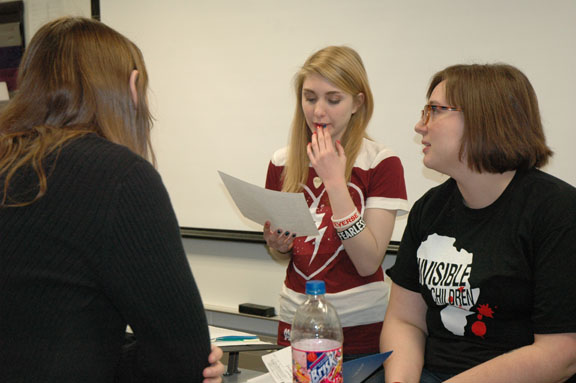Invisible Children club officers will host an art show in the SoHo Cafe and Gallery on March 24 from 6:30 to 9 p.m., in support of the “Kony 2012” campaign, according to club president Anna Sands.
The campaign, led by the Invisible Children organization, aims to raise awareness of war crimes committed by Lord’s Resistance Army leader Joseph Kony in Central Africa. The organization hopes to encourage US military advisers aiding the Ugandan army in capturing Kony this year, according to Invisible Children’s Kony 2012 website.

According to Sands, although Kony has been on the run for over 20 years, this is an important time for the cause.
“It blows my mind that 30,000 children can be kidnapped or killed and the rest of the world has no idea what’s going on,” Sands said.
At the art show, club members will display Invisible-Children- and Kony-2012-themed pieces of art, all student-made, according to Sands. They plan to raise money by holding these pieces of art for silent auction. They also plan to host a benefit concert on April 20. Since they will host these events off school grounds, Sands said, they will primarily advertise them through word of mouth and the club’s Twitter and Facebook pages.
Club officers hosted a viewing party and second call-out meeting on March 12. At the meeting, students watched the “Kony 2012” short documentary, recently released by the Invisible Children Organization. The film went viral, receiving millions of views and bringing Invisible Children and the crisis in Central Africa to the public eye.
“I think it’s a great cause to help raise awareness of the atrocities around the world that we often don’t know about,” Alicia Noneman, Invisible Children club sponsor since its beginning in 2008, said.
In the past, Sands said, club members have raised money for Invisible Children through various fundraisers and in 2010, invited Ugandan refugees to speak at the school as part of Invisible Children’s Legacy and Face-to-Face tours.
Despite the popularity of the Kony 2012 campaign, Invisible Children has received criticism for oversimplifying facts in their documentary and spending only a third of their expenses directly on programs in Central Africa, among other claims. The organization has refuted these criticisms in a series of responses on their website.
According to Sands, all the money club members receive from these events will go to the club’s sister school in Uganda, Layibi Secondary School, an all-boys school with a 71 student to teacher ratio.
“The funds will help with the classroom settings and providing for teachers,” Sands said.
These funds, according to Noneman, go through the Invisible Children organization to Layibi Secondary School, so club members do not have control over how much of their donations end up at their sister school.
However, Sands said, she has been satisfied by Invisible Children’s responses to the criticisms leveled at the group’s finances and activities. According to her, she has no doubt that club members’ efforts serve a great purpose.
“I’ve talked with Ugandan refugees,” Sands said, “and I’ve seen how (Invisible Children) is helping.”




























![Keep the New Gloves: Fighter Safety Is Non-Negotiable [opinion]](https://hilite.org/wp-content/uploads/2024/12/ufcglovescolumncover-1200x471.png)















































![Review: “We Live in Time” leaves you wanting more [MUSE]](https://hilite.org/wp-content/uploads/2024/12/IMG_6358.jpg)
![Review: The premise of "Culinary Class Wars" is refreshingly unique and deserving of more attention [MUSE]](https://hilite.org/wp-content/uploads/2024/12/MUSE-class-wars-cover-2.png)
![Introducing: "The Muses Who Stole Christmas," a collection of reviews for you to follow through winter [MUSE]](https://hilite.org/wp-content/uploads/2024/12/winter-muse-4.gif)
![Review: "Meet Me Next Christmas" is a cheesy and predictable watch, but it was worth every minute [MUSE]](https://hilite.org/wp-content/uploads/2024/11/AAAAQVfRG2gwEuLhXTGm3856HuX2MTNs31Ok7fGgIVCoZbyeugVs1F4DZs-DgP0XadTDrnXHlbQo4DerjRXand9H1JKPM06cENmLl2RsINud2DMqIHzpXFS2n4zOkL3dr5m5i0nIVb3Cu3ataT_W2zGeDAJNd_E-1200x884.jpg)
![Review: "Gilmore Girls", the perfect fall show [MUSE]](https://hilite.org/wp-content/uploads/2024/11/gilmore-girls.png)
![Review in Print: Maripaz Villar brings a delightfully unique style to the world of WEBTOON [MUSE]](https://hilite.org/wp-content/uploads/2023/12/maripazcover-1200x960.jpg)
![Review: “The Sword of Kaigen” is a masterpiece [MUSE]](https://hilite.org/wp-content/uploads/2023/11/Screenshot-2023-11-26-201051.png)
![Review: Gateron Oil Kings, great linear switches, okay price [MUSE]](https://hilite.org/wp-content/uploads/2023/11/Screenshot-2023-11-26-200553.png)
![Review: “A Haunting in Venice” is a significant improvement from other Agatha Christie adaptations [MUSE]](https://hilite.org/wp-content/uploads/2023/11/e7ee2938a6d422669771bce6d8088521.jpg)
![Review: A Thanksgiving story from elementary school, still just as interesting [MUSE]](https://hilite.org/wp-content/uploads/2023/11/Screenshot-2023-11-26-195514-987x1200.png)
![Review: "When I Fly Towards You", cute, uplifting youth drama [MUSE]](https://hilite.org/wp-content/uploads/2023/09/When-I-Fly-Towards-You-Chinese-drama.png)
![Postcards from Muse: Hawaii Travel Diary [MUSE]](https://hilite.org/wp-content/uploads/2023/09/My-project-1-1200x1200.jpg)
![Review: "Ladybug & Cat Noir: The Movie," departure from original show [MUSE]](https://hilite.org/wp-content/uploads/2023/09/Ladybug__Cat_Noir_-_The_Movie_poster.jpg)
![Review in Print: "Hidden Love" is the cute, uplifting drama everyone needs [MUSE]](https://hilite.org/wp-content/uploads/2023/09/hiddenlovecover-e1693597208225-1030x1200.png)
![Review in Print: "Heartstopper" is the heartwarming queer romance we all need [MUSE]](https://hilite.org/wp-content/uploads/2023/08/museheartstoppercover-1200x654.png)




